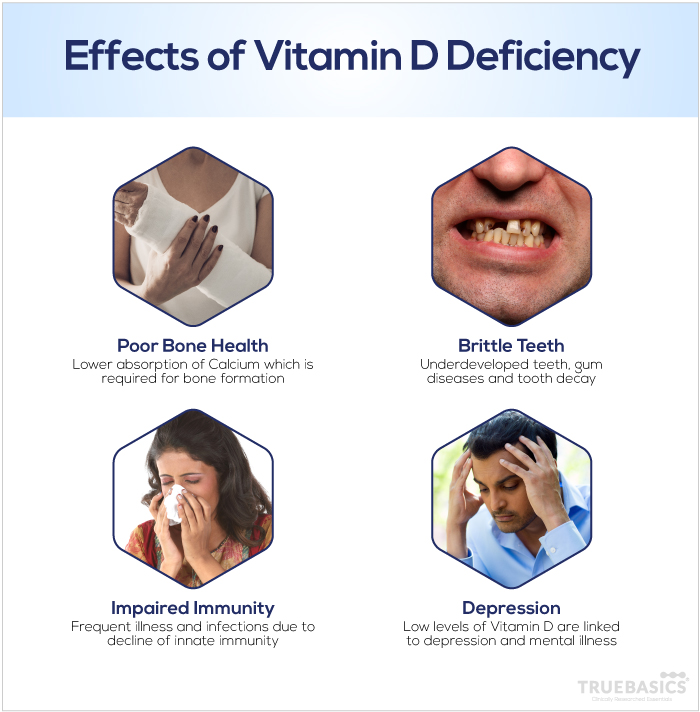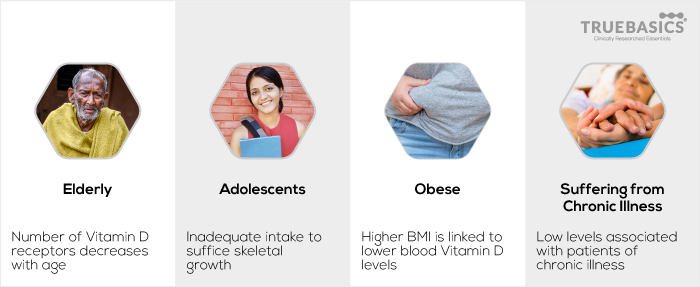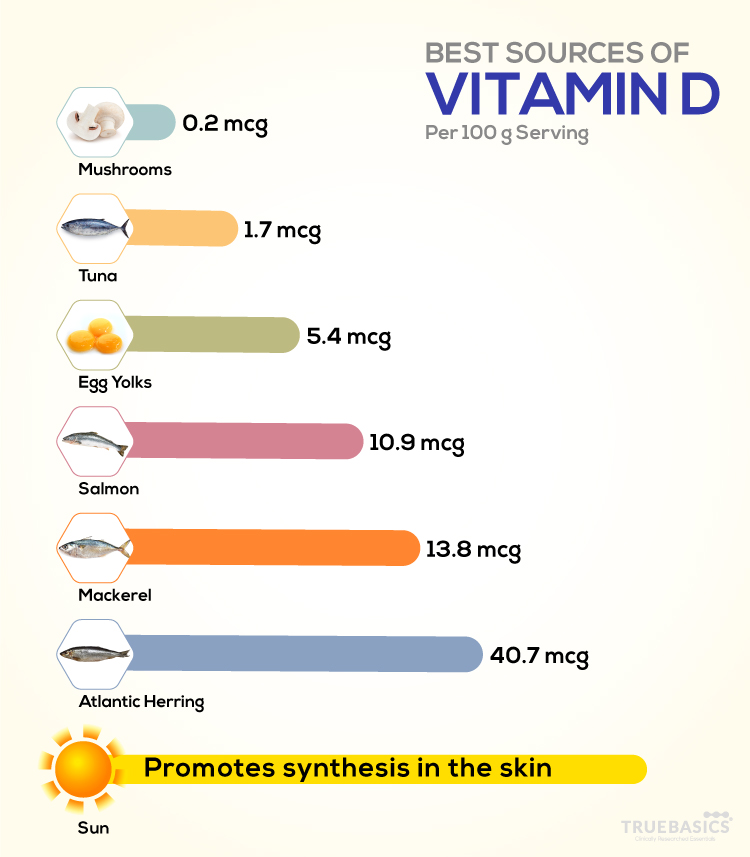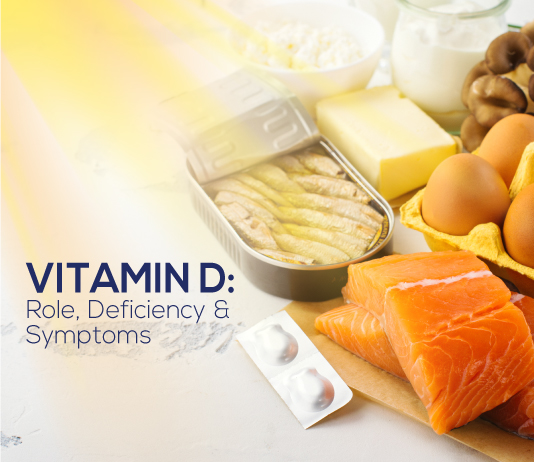Vitamin D is an umbrella term for a family of fat-soluble vitamins that include:
- Vitamin D2 (ergocalciferol): Found in plants and fortified foods
- Vitamin D3 (cholecalciferol): Synthesized by the skin on exposure to Ultraviolet B (UVB) rays from the sun and obtained from animal-sourced foods.
The human body is capable of synthesizing Vitamin D itself. Certain cholesterol molecules present deep within the skin act as precursors, or the ‘inactive’ form, of Vitamin D and get ‘activated’ in the presence of UVB rays. Enzymes in the liver and kidney metabolize the ‘activated’ molecule to give Vitamin D. The action of sunlight in Vitamin D synthesis is the reason that Vitamin D is commonly known as the ‘sunshine vitamin’.
Dietary Vitamin D, obtained from food sources, is also present in its ‘inactive’ form. It is first metabolized in the liver and then transported to the kidney, where it is converted to the ‘active’ form by a protein enzyme through a series of complex metabolic processes. In this active form, it flows through the bloodstream and is utilized by the body.
Functions of Vitamin D
1. Formation of bone & teeth
Bone mineralization is a biological process in which inorganic minerals like calcium and phosphorus, fit upon an organic mesh-like matrix of collagen proteins. Vitamin D is a crucial stimulant and promoter in the mineralization of collagen, thereby assisting in the formation of healthy bone and teeth.
2. Absorption of calcium and other minerals
Once Vitamin D has been metabolized, it travels throughout the body in the form of a hormone. It regulates the levels of calcium in our bodies by enhancing gastrointestinal and renal absorption of calcium ions. Additionally, it is also known to stimulate the absorption of phosphorus and magnesium ions. These minerals play an important role in maintaining healthy bones.
3. Immunological action
Vitamin D has been found to modulate immune responses by strengthening the body’s innate immunity system. Vitamin D decreases the production of inflammatory cytokines while increasing the production of their anti-inflammatory counterparts. The best example lies in the case of respiratory health, where Vitamin D reduces inflammation and enhances defenses against pathogens.
4. Maintenance of muscle strength
Studies have shown that Vitamin D helps to optimize muscle strength, mass, and function. As we get older, the number of Vitamin D receptors in our body decreases, which translates to reduced muscle strength in old age. Moreover, it has been found that elderly people deficient in Vitamin D are at a high risk of falls and fractures.
Effects of Vitamin D Deficiency

Even though Vitamin D can be metabolized by the body, the deficiency of this vitamin is still prevalent in India. Prolonged deficiency of Vitamin D can cause:
1. Poor bone health
Vitamin D is also known as an anti-rachitic factor. Its deficiency leads to two debilitating conditions: Rickets in children and Osteomalacia in adults.
Rickets is caused due to prolonged deficiency of Vitamin D. This impacts bone health in two ways – neither the bone matrix will have an optimum structure, nor the calcium ions will be absorbed during metabolic activities. This leads to a constant depletion of the calcium already present in the body through the urine, and consequently to soft, thin and weak bones. Movement is painful and other skeletal deformities, like bowlegs in babies, knock-knock knees in older children and a protruding ‘pigeon chest’ due to deformed ribs, are also seen.
In Osteomalacia, soft bones get bent and deformed due to body weight. The risks associated with Osteomalacia are plenty, but an afflicted person is more likely to be prone to spontaneous fractures especially in the ribs, spine, and legs. The deficiency of Vitamin D also leads to a systematic deficiency of calcium and phosphorus.
Did You Know: Certain seizure medications, like phenytoin, can cause severe Vitamin D deficiency.
2. Impaired immunity
Low levels of Vitamin D have been found to increase the chances of respiratory tract infections like pneumonia and bronchitis and may be responsible for a variety of ailments, including regular cold and flu. In one study, deficient people with chronic lung disorder reaped great benefits after taking Vitamin D supplements for a year.
Did You Know: Vitamin D deficiency is believed to be the underlying cause of certain autoimmune diseases like Type 1 Diabetes and Multiple Sclerosis.
3. Mental health
Although there can be many intricately related causes for depression, researchers have been finding new links between the mental health illnesses and Vitamin D deficiency, hinting at a more multifaceted relationship between the two. One study found that tackling Vitamin D deficiency through a combination of light therapy and exercise alleviated the symptoms of participants facing depression.
The production of Vitamin D3 rests solely on sunshine, which is unpredictable depending on the latitude, use of sunscreen, skin pigmentation, season, pollution levels and other lifestyle quirks. Despite falling in the tropical-temperate zones, Vitamin D deficiency is far more common in India than one would estimate. Unfortunately, 79% of Indians are deficient in Vitamin D. This can also be attributed to limited access to the food sources that cater to our Vitamin D demands.
Did You Know: The groups that are at maximum risk for Vitamin D deficiency i.e. the elderly, adolescents, obese people and those with chronic illnesses, are also at risk for depression.

Combating Vitamin D Deficiency
ICMR recommends a daily Vitamin D intake of 10 mcg for both men and women. If you have been noticing symptoms of Vitamin D deficiency like muscle pains, chronic hair loss, fatigue, bone and back pains, fret not. You can satiate your Vitamin D requirements by following ways:
- Get sunlight
We obtain a major percentage of Vitamin D through sunlight. However, here are some things to keep in mind.
The best time to get Vitamin D is at noon when the UVB rays are most intense. But since the rays cannot penetrate glass, you could be getting all the sunshine and no Vitamin D by sitting near glass windows. A similar predicament is faced if you always wear full clothes and sun-block when you are outside.
People with darker skin have more melanin and have to spend longer in the sun compared to light-skinned people in order to produce equivalent amounts of Vitamin D.
However, control your amount of time spent in direct sun as long exposure to sunlight can affect skin cells and keratin in the hair.
- Eat fatty fishes
Fatty fishes like salmon, mackerel, and tuna are one of the best dietary sources of Vitamin D. The highest content of Vitamin D is in mackerel containing 13.8 mcg per 100 g serving followed by salmon containing 10.9 mcg per 100 g serving and tuna containing 1.7 mcg per 100 g serving.
- Consume egg yolks
For people who do not eat fish and seafood, egg yolks are a good alternate source of Vitamin D. While most of the protein in an egg is found in the white, the fat, vitamins, and minerals are found mostly in the yolk. 100 g serving of egg yolks contains 5.4 mcg of Vitamin D.
- Eat mushrooms
Mushrooms are the only good vegetarian source of Vitamin D. Like humans, mushrooms can also synthesize Vitamin D when exposed to UVB light. However, mushrooms produce Vitamin D2 unlike Vitamin D3 in humans. White mushrooms contain 0.2 mcg of Vitamin D per 100 g serving.

In Conclusion…
Vitamin D is an important nutrient for many bodily functions. Our body can synthesize Vitamin D from sunlight and obtain it from dietary sources. While India is a sunny country, 79% of Indians are deficient in Vitamin D leading to poor bone and teeth health, impaired immunity and depression.
Getting enough sunlight during afternoon hours when UVB light is most intense and including Vitamin D rich foods in the diet are healthy choices to combat Vitamin D deficiency.
In today’s time and age, maintaining a healthy and balanced diet becomes difficult. A good alternative is to include quality supplements like fish oils and Vitamin D3 (cholecalciferol) in conjunction with calcium which can be beneficial in tackling symptoms associated with Vitamin D deficiency.
#ShareIfYouCare #RepublicofDeficiency
Sources:
[1] https://www.ncbi.nlm.nih.gov/pmc/articles/PMC3166406/
[2] https://www.ncbi.nlm.nih.gov/pmc/articles/PMC3166406/
[3] https://www.ncbi.nlm.nih.gov/pmc/articles/PMC2759054/
[4] https://www.sciencedaily.com/releases/2014/10/141031081918.htm
[5] https://www.ncbi.nlm.nih.gov/pmc/articles/PMC3513873/
[6] https://www.ncbi.nlm.nih.gov/pmc/articles/PMC2908269/
[7] https://www.ncbi.nlm.nih.gov/pmc/articles/PMC3942730/













